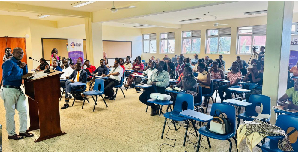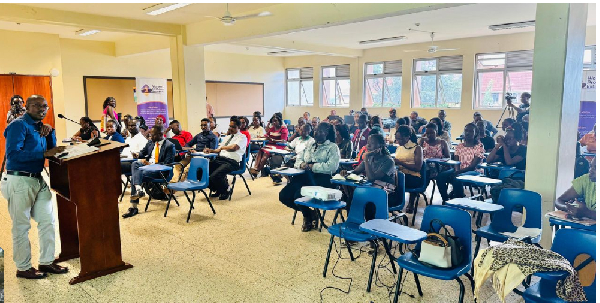 Makerere University students attending the gender justice debate
Makerere University students attending the gender justice debate
Speaking during a student engagement at Makerere University yesterday, Mr Titus Asiimwe, the program manager at the Women’s Pro-Bono Initiative, emphasized that male engagement is key to breaking the silence surrounding gender and health rights
Lawyers under the umbrella of the Women’s Pro-Bono Initiative have called on male university students to actively participate in promoting gender justice, particularly in addressing sexual and reproductive health issues.
Speaking during a student engagement at Makerere University yesterday, Mr Titus Asiimwe, the program manager at the Women’s Pro-Bono Initiative, emphasized that male engagement is key to breaking the silence surrounding gender and health rights.
“Male engagement is not a battle between men and women,” said Mr Asiimwe. “It’s about inviting everyone—especially men—to take responsibility for their sexual and reproductive health. These issues are affecting both genders, but many men are still silent.”
He added that cultural norms discourage men from seeking help, even when dealing with serious health challenges, unlike women who are more likely to access health services.
“Women often reach out for help, but many fail to recover fully because their partners are unwilling to speak out or seek treatment themselves,” he noted.
Ms Rose Wakikona, the Deputy Executive Director of the Women’s Pro-Bono Initiative, stressed the importance of involving men in discussions around sexual and reproductive health, especially within the younger generation.
“We’re seeing women disproportionately affected by gender-based violence and inequality. But we also realize that men are struggling with the shifting dynamics of power. Many feel left behind as women become more empowered,” she said.
Ms Wakikona argued that gender justice should not exclude men but instead engage them constructively so they don’t feel alienated.
“Our goal is to ensure that men are part of the solution—not sidelined by the empowerment of women, but involved and uplifted alongside them.”
Mr Amon Ashaba Mwine, a senior lecturer in the Department of Gender Studies at Makerere University, also weighed in, highlighting the positive impact of men working alongside women in advocacy efforts.
“When women activists collaborate with men, especially on issues like domestic violence and female genital mutilation, we’ve seen significant progress,” he said.
Mr Mwine also pointed out that many men experience violence but are reluctant to report it due to stigma or fear.
“Gender equality isn’t just about empowering women—it also benefits men,” he said. “To move forward, we need to redefine the role of men in society and include them at every level in the fight for justice and equality.”
The engagement at Makerere marks a growing effort to bring male voices into the gender conversation, shifting the narrative from one of exclusion to one of shared responsibility.
